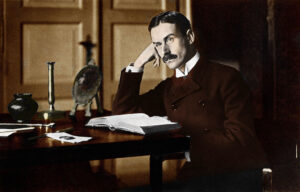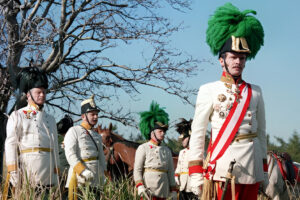The great unification processes of the late 19th century inspired some of the world’s most famous authors. In 1886, Henry James explored the triangular relationship between a Confederate War veteran from Mississippi and two New England feminist abolitionists in The Bostonians. Fifteen years later, Thomas Mann’s Buddenbrooks chronicled not only the downfall of a Hanseatic merchant family, but also the enduring chasm between north and south in Germany.
If both Henry James and Thomas Mann were writing relatively close to the period they were depicting, Giuseppe Tomasi di Lampedusa’s The Leopard (1958) was written nearly a hundred years after the event. It is nevertheless considered a classic account of the Italian Risorgimento, examining it through the Prince of Salina, a Sicilian aristocrat in his mid-forties who grapples with the forces unleashed on the island by the collapse of the old Bourbon Regime in 1860. And the film version by Luchino Visconti (1963) is still one of the most powerful pieces of cinema ever created.
The Leopard is an extraordinarily ambivalent and complex work of art, but from the historical and political point of view, it is dominated by two themes. First, there is the tension between continuity and change. The Prince, initially loyal to the King in Naples, is persuaded by his impetuous young nephew, Tancredi, that he should embrace the revolution and in so doing neutralise it. “Unless we ourselves take a hand now,” Tancredi famously warns, “they’ll foist a Republic on us. If we want things to stay as they are, things will have to change.”
At least on the surface, it seems as if the Prince’s bet pays off. The revolutionary zealots of Garibaldi are soon replaced by the polished Piedmontese officers of the new united Italian army. The inhabitants of the Prince’s summer holiday retreat at Donnafugata welcome him back as if nothing had changed. Tancredi marries the daughter of the wealthy upstart mayor Don Calogero and goes into politics.
Second, The Leopard exposes the failure of Italian Unification. Lampedusa shows it to have been basically a takeover of the south by the north. The Piedmontese envoy sent to persuade the Prince to become a senator in the new united legislature refers to the happy “annexation” before hastily correcting himself to “union” while the Prince himself predicts that it will “simply mean Torinese rather than Neapolitan dialect, that is all”. Unification was also maimed at the start by the mendacity of the liberal nationalists who simply binned contrary votes in the referendum on unification. In the film, the announcement of the cooked result becomes farcical as the off-key band keeps on breaking into Don Calogero’s platitudinous speech.
The enduring relevance of The Leopard to Italy is obvious. Nearly 175 years after unification, the country remains fundamentally divided between north and south, and more so than any other European country. The Mezzogiorno — as the south of the country is often called — still lags far behind the more developed north. A major contemporary political party, the Lega, formerly Lega Nord, has espoused secession in the past. No wonder that The Leopard is a set text in Italian schools.
It is with respect to Europe as a whole, though, that the book resonates most powerfully today. Before we can understand why, we need to come to a better understanding of the author’s beliefs and intentions. The cynical phrase about things changing so that they can stay the same was certainly Tancredi’s belief and the Prince’s hope, but it reflected neither Lampedusa’s own programme, nor what he was trying to convey about the nature of the Risorgimento. It has been widely misinterpreted.
The author despaired not only of the Sicilian aristocracy from which he descended but also of the island as a whole. We know from his excellent biographer David Gilmour that Lampedusa was no reactionary, but an Anglophile Whig. He dearly wished that his ancestors had grasped, for example, the possibilities opened up to them by the British-brokered Sicilian constitution of 1812. He wanted nothing more than for his countrymen to wake from their torpor and join what he called in the novel “the flow of universal history”. Visconti captured this inertia well with the two great scenes which bookend his film: the lengthy opening recitation of the rosary, so rudely interrupted by news of Garibaldi’s landing; and the interminable dance sequences, a kind of aristocratic rosary, at the end, punctuated by gunshots marking the execution of some now redundant revolutionaries.
It was, in fact, the Prince himself who delivered the most devastating indictment of Sicily’s failure to progress. Surely, the kind if naïve Piedmontese envoy asks, “the Sicilians must want to improve”? The Prince replies that “the Sicilians never want to improve for the simple reason that they think themselves perfect; their vanity is stronger than their misery”. Their “pride”, he continues, is merely “blindness”. What Sicilians want from politics, the Prince says, is “sleep and they will always hate anyone who tries to wake them”. That is why, he explains, the island had always been a “colony” and, we intuit, always will be.
Unsurprisingly, The Leopard shocked Lampedusa’s aristocratic relatives when it came out, and outraged wider opinion in Sicily. The book was clearly an indictment of the island and its history. Leonardo Sciascia, then Sicily’s greatest living writer, bitterly attacked it on those grounds. If he later recanted, then only because he had come to agree with Lampedusa.
The author did not believe that things did not change. They plainly did, even in the novel. The Prince’s power, and that of his class, slips away in myriad ways. He himself acknowledges in a famous exchange with his confessor, Father Pirrone, that the nobility has merely secured a stay of execution, not developed a viable strategy for long-term survival. In due course, Mussolini plunged the nation into a catastrophic war, which Lampedusa alludes to only in passing, in an aside about the Pittsburgh-made American bomb which later shatters the palace in which the ball took place. When Lampedusa was writing in the Fifties, the latest conquerors of Sicily had been the Anglo-Americans who landed on the island in 1943, booted out the Nazis, and blasted his childhood home in Palermo to pieces.
Europe today is Italy yesterday (and today). The continent, Henry Kissinger lamented back in 2019 at a policy event, had “checked out” and was making neither a sufficient financial nor an adequate intellectual contribution to the common defence. If it persisted in this stance, Kissinger also warned, the continent would end up as a “strategic appendage of Eurasia”, of the Sino-Russian cartel — in effect a colony.
Kissinger could easily have expanded the indictment. At the time of his remarks, the European Union was attempting to run a common currency without a common state or even a common economic policy, causing a sovereign debt crisis which nearly destroyed the euro. It had created a passportless common travel area without properly securing its external border, resulting in an unprecedented migration crisis. Meanwhile, the continent was rapidly losing its economic edge to the Indo-Pacific. In the field of security, Europe was not only failing to mobilise against Vladimir Putin’s ambitions but actually deepening its dependency on Russian energy through the construction of a second pipeline through the Baltic Sea.
Since then, the situation has deteriorated further. Even Putin’s full-scale attack on Ukraine, though it produced the biggest European response to date, did not lead to a sea change. In fact, some European countries like Germany are beginning to retreat from the strong stances they adopted at the outset. Olaf Scholz’s much-heralded Zeitenwende has thus joined the long list of turning-points at which German (and European) history failed to turn. Scholz’s government wanted to change things just enough so they could stay the same. In security terms, most of Europe is still little more than an American colony, completely dependent on US military protection. But as the war in Ukraine reaches its denouement and President-elect Donald Trump threatens to withdraw, or at least re-negotiate, the American defence umbrella, the Continent needs to wake from its deep Sicilian slumber.
If Europeans really want things to remain halfway the same, in other words to maintain their standard of living, security and territorial integrity, they will have to make some very far-reaching changes. As British and American observers, including the present author, have repeatedly pointed out there are basically two options. Europe can form a full political union rallying the entire resources of the Continent on the lines of the United Kingdom or the United States. Alternatively, the Continent can re-configure itself as a looser confederation of sovereign nation-states each of which is truly committed to its own and the collective defence through Nato. So far, Europeans have done neither, not because anyone is stopping them, but because like The Leopard’s Sicilians they prefer the rest of oblivion to the effort of action.
Most likely, neither the election of Donald Trump, nor the dire situation in Ukraine will actually rouse Europe from its torpor. As Russia advances, Europeans will recite interminable rosaries about the need to “step up”, but they will not undertake the necessary fundamental reform. Europe’s vanity is stronger than its sense of strategic squalor. Like Lampedusa’s Sicily, the Continent thinks itself already perfect, and certainly far superior to its Anglo-American lecturers. But the idea that Europeans just have to change a little so that things stay the same is an illusion. While the continent sleeps, things are changing, and will continue to change, just not for the better.
Disclaimer
Some of the posts we share are controversial and we do not necessarily agree with them in the whole extend. Sometimes we agree with the content or part of it but we do not agree with the narration or language. Nevertheless we find them somehow interesting, valuable and/or informative or we share them, because we strongly believe in freedom of speech, free press and journalism. We strongly encourage you to have a critical approach to all the content, do your own research and analysis to build your own opinion.
We would be glad to have your feedback.
Source: UnHerd Read the original article here: https://unherd.com/



